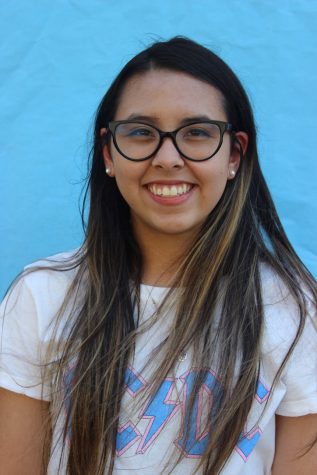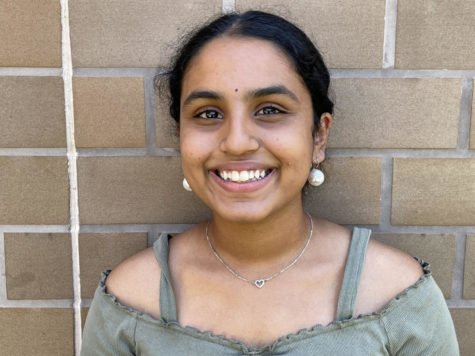Tribune alumni answer commonly-asked questions on college applications
Wildcat Tribune alumni, who have experienced the stress and difficulties of college admissions, give advice to current high school seniors working on their applications.
October 26, 2021
As current high school seniors approach college application deadlines, we asked our amazing Wildcat Tribune staff alumni to answer some of the most commonly asked questions on how to navigate the college applications process. Caroline Lobel (editor-in-chief, 2020-2021), Aria Khalique (multimedia editor, 2020-2021), Aditi Lappathi (news editor, 2020-2021), Sraavya Sambara (editor-in-chief, 2019-2020), and Daniela Wise-Rojas (social media manager, 2020-2021) all wrote some amazing responses to your questions!
Q: What was the hardest challenge you faced during your freshman year of college?
Aria: Well I’m still in my first year of college so new challenges approach me all the time. For me, it was finding people I felt genuinely close to. I feel like in the first few weeks of college I made a lot of casual acquaintances but it took time for me to find people I truly enjoy being around and who made me feel secure.
Caroline: Staying in touch with my parents. It’s not about how much time you have, but rather how much time you’re willing to make to keep in contact. As an only child who’s still close to home, I feel obligated to talk to my parents every day and go back every other week or so because I know that’s what they want from me. However, I personally want to focus on my life at college. Like as much as I should call my mom, there’s always something else that I either need to do or want to do more. Finding that balance between family and college life is a challenge.
Aditi: I’m still a college freshman, but I think it was adjusting to being in college. Living somewhere different, especially in a dorm where so many things are communal, finding new friends and people to talk to, all while adjusting to classes and new study techniques is a lot.
Sraavya: I guess my college freshman year was definitely more different than most people because most of it was completely online. The challenge was just making sure that you’re connecting with people around you because it’s not something that happens easily in a virtual environment. I just had to be really intentional with contacting both professors and classmates and friends. I don’t think you get as much casual interaction that you would in a normal year, so I had to go out of my way to talk and get to know people to form some sort of a connection.
Daniela: There really isn’t one single thing I struggled with most. Something that many don’t realize is that although you’re moving onto a new stage in your life, this doesn’t mean your old problems stay behind. They follow you, they just manifest themselves in a different way. Everyone has their own struggles; a lot of my friends struggled with some form of homesickness. I was never homesick. However, I still struggle with feeling alone even when I’m surrounded by people. You have to rebuild your support system (or at least, restructure it), all while facing new academic and social expectations. I’m working on giving myself some slack, and so should you. Highly recommend going to therapy (even when you think you’re doing great), especially since college healthcare is usually pretty awesome.
Q: How do I know whether to ED (early decision)?
Aria: I applied ED and didn’t get into the school but then I applied ED2 to Smith College and got in. I would say applying ED is a big decision. By the time my decision for my ED school came out, I had fallen very out of love with it. I think it’s incredibly important to have visited or be very very familiar with the school in order to commit to it so early. If you are super in love with the school, have done a bunch of research, and know that that is where you want to be, totally ED because that increases your chances of going to the place you want to be. I regretted my decision to ED but that was because I actually wanted to be at my ED2 school. I never regretted my decision to ED2 to Smith. I knew I absolutely wanted to be there and I loved every part of it. Now, after being at Smith for almost a semester, I can say that my decision to ED2 was so correct because I love it here. It all depends on you and your level of excitement about the school. Don’t think of it in a strategic way, think of it in terms of you living your life at that school for the next four years.
Caroline: There are two factors to consider when deciding whether to ED. The most obvious one is your willingness to attend: This is the school I 100% want to attend, I don’t care about any other school’s decision. The other factor is your ability to attend: I can 100% pay the cost of attendance for this school. ED is also a binding financial commitment. For me personally, I didn’t ED anywhere because I knew a private school wouldn’t be the best for me financially, so I definitely needed to consider different options such as in-state tuition and financial aid offers from multiple schools. Don’t ED unless it’ll be the only college decision you care about. It’s not worth the slight increase in acceptance rate if you’re considering at least one other school.
Daniela: Good question. Here’s my mini checklist, or flow chart.
- Is this a college you really like? -> Why do you like it? (Give a unique response) -> Do you have the money in the event that colleges give you less financial aid and have you already talked to your family about this decision? -> Will the quality of your application be significantly lower if you did it ED? If so, then consider RD. If not, go with ED
- Personally, I didn’t do any school ED. I wanted options, plus I needed to see all financial packages before committing.
Q: How many colleges should we apply to?
Aria: I don’t think the number of schools you apply to matters as much as if you like the school. I applied to a bunch of schools that I did not research enough and later realized that I legitimately did not want to be there. I would say do a lot of research into each school before you apply because application fees are not cheap and you should not be spending that much money to have a chance at a school you don’t even want to be at. Make sure you apply to at least two safeties but despite that, it is up to you. Sometimes applying to more schools eases tensions for people but also remember to think about finances and how costly applications can be (not just the common app fee but sending SAT scores and transcripts). I applied to about 10 schools but I’d say that it varies for everyone and again, the amount of schools means nothing if you don’t like half of them.
Caroline: Anything around 10 is good. I applied to four private schools and six UCs. College apps are a lot of work and super expensive. It all adds up real fast, and in the end, you’re only choosing one school to attend.
Aditi: I think that you can apply to as many as you want, but I think that you shouldn’t apply to more than 15. During the application, it’s going to be hard to apply to all of them, especially if you have to write specific essays for each school. Also, after you get your acceptances, it’s going to be hard to choose between schools if you have too many, especially if they are all schools that you want to go to.
Sraavya: I think 15 might be a good number to ensure you have safety, match, and reach schools. I don’t think there should be a limit on how many reach schools you apply to, but there should be a lower limit on how many safeties you apply to just to be safe.
Daniela: This depends! Usually, the sweet spot is between 8-12 schools. A lot of people do 15. I had little faith in my abilities and I talked to my family about application fees beforehand. Hence, I applied to 30 schools. I know, it’s a lot. But I don’t regret it. Keep in mind, though, that I applied test-optional. I didn’t send any test scores to any schools, hence I didn’t need to pay for those on top of the usual application fees.
Q: What are some tips on how to overcome perfectionism when trying to write essays?
Aria: Hmm this is a good question. I think the trick is to not think about the stakes involved. I never really processed the fact that my essays could make or break my decision. I knew they were important but I just never gave them that much weight. I wrote my essays the way I write all my papers. I brainstormed, outlined, wrote, edited, and submitted. I wasn’t too stressed about it. I treated them more as a task to get done than the biggest assignment of your life. That mindset might not have been the best for my essay content, but it helped with my mental stress.
Caroline: Colleges admit you based on how well they think you’ll fit into their school. If your essay is tailored to what the college will find to be perfect, you’re not exactly helping yourself if you’re presenting a false representation of yourself as a result. Obviously, you want to get into your dream school, but you don’t actually know how much you’ll fit until you get there. Focus on presenting your best, genuine self rather than writing the “perfect” essay.
Sraavya: I think just being aware that there’s definitely diminishing, the marginal benefit to spending more time on your essay. If you’ve got it to a point where your voice really shines through, I don’t think there’s much of a point in spending more time to make your essay very perfect. Whatever you’re thinking is imperfection is probably not visible to other people or the admissions readers. So work hard on it, but let it be a bit spontaneous and organic, and don’t spend too much time stressing out about it.
Daniela: There is no way to write the “perfect” essay, much like there is no way to write an essay that will get you into a certain school. I don’t know what got me in. I also don’t know what didn’t get me in for the schools that rejected me. Writing is so subjective, and everyone has their own style. It’s not math where 2+2=4. In the writing world, one would describe the size of the 2 and what the significance of the 2 is, not give the answer. “Show, not tell” and add “yet” to the end of any self-deprecating sentiment (ex, “this isn’t my best essay YET.”), is some advice that my mentor and Tribune journalism advisor Ms. Rachel Decker gave to me during the admissions process. Perfect humans don’t exist, in the same way that perfect essays don’t exist. The “perfect” essay will be an essay that perfectly illustrates you and nobody else. That’s all that matters.
Q: How to keep yourself from getting too attached to your dream school?
Aria: Oooo well that’s hard. The way I kept myself from getting attached to my ED school was to find a school I liked better which backfired quite badly. I would say that you should continuously be looking at the schools you applied to even after the process. Follow them on social media, read about research they do and professors they have because then you find things you enjoy about each school. It might not completely deter you from preferring your dream school, but it gives you more options to look forward to if it doesn’t work out. Just try to find a bunch of good things about each school you apply to so then you’re excited no matter where you get in.
Caroline: Do you know a single person who hates the college they ended up at? Every college student I’ve talked to has only had positive things to say about their school and experience. While your dream school serves as a good motivator throughout high school, you will be fine wherever you end up going for college. And, if it’s really that bad, you can always transfer. If you do get too attached to your dream school, you won’t be able to see the benefits and commonalities of other schools. Having a dream school isn’t bad as long as you keep an open mind when it comes to other schools. (PS: I didn’t get into any of my dream schools, but I wholeheartedly believe I’m happier where I am now than I would be had I ended up at those other schools. It truly does work out in the end.)
Sraavya: Just know that things will likely happen for a reason, and it’s very possible that things will work out in unexpected ways. Just know that there’s a lot of amazing schools out there, and whatever school that you think is right for you in your senior year of high school might not be what’s right for you in the future. So just don’t take it too seriously.
Q: How do you know if a school is a good fit for you?
Aria: That’s a loaded question. There are so many factors at play when finding a “good fit”. I personally think you just have to feel it. I first looked into Smith and was intrigued by it because I had never thought of going to a historically women’s liberal arts college. But when I watched YouTube tours and videos, I absolutely fell in love with it. I could see myself there, studying by the pond, reading in the library and walking around the lawns. All I can say is that you have to see yourself at the school. Lots of people talk about factors like small/big school, class size, location, distance from home, grade deflation and so many more. These are all important factors but don’t make decisions on all the factors and then close yourself off to other ideas. Be open to looking at new schools that you’ve never heard of and the good fit will find you. I would say its all about the feeling you get when you look at the campus. Can you see yourself there? Does it feel like home? Those are basically the most important things.
Caroline: Figure out your preferences first. The easiest elimination factor for me was location because I had a clear idea of which specific places I wanted to live in. If a school wasn’t in/near a city I wanted to be in, I didn’t consider it. From there, I considered more school-specific aspects such as educational opportunities and such. With choosing a college to attend, it’s easy to get caught up in the prestige and reputation of the school, but that isn’t always reflective of it being the right school for you. Prioritize your own interests and see which schools check those boxes for you.
Sravvya: I feel like if you spending enough time looking through the school’s material and website, you’d get a good sense of its vibe. BUt it’s really hard to know what’s a good fit until you go somewhere. Some schools may not be right for you; for example, if you’re interested in humanities, a STEM or engineering-focused school is probably not right for you. But other than that, just getting the vibe from youtube videos and college vlogs, and stuff like that. You can just be a little spontaneous about it.
Aditi: I would attend any events they have for incoming freshmen so that you can get to know the school better. Also, ask people who currently attend that school and ask them more about how they like going there.
Q: What was the best piece of advice you got during the college admissions process?
Aria: Hm I don’t remember getting that much advice but I can say the best advice I would give having been through it. I would say to do a BUNCH of research on each school before you apply. It sounds tedious and exhausting and some college websites are designed horribly, but it is worth it. You learn what you want and don’t want in a college, you find out which schools you truly want to apply to, and you can get excited for your next four years.
Caroline: I didn’t really get much advice during the college admissions process. I’m a first-generation student who didn’t have a college counselor, so it was literally just me and my laptop. With that said, my biggest takeaway is that college apps are only as consuming and important as you make it out to be. It ended up not being a big deal for me. If you don’t get into a four-year straight out of high school, community college is most usually a guaranteed backup. College admissions is not the end all be all.
Sraavya: Somebody told me to not stop living your life the entire senior first semester, so I guess just taking things lightly and being really humble about the process. The process is very arbitrary since no one knows what’s going on. So there’s not a huge point in putting that much effort.









